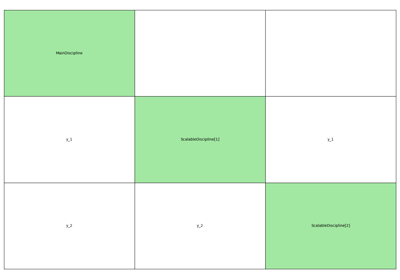scalable_problem module¶
The scalable problem.
- class gemseo.problems.scalable.parametric.core.scalable_problem.ScalableProblem(discipline_settings=(ScalableDisciplineSettings(d_i=1, p_i=1), ScalableDisciplineSettings(d_i=1, p_i=1)), d_0=1, add_random_variables=False, alpha=0.5, seed=1)[source]¶
Bases:
objectThe scalable problem.
It builds a set of strongly coupled scalable disciplines completed by a system discipline computing the objective function and the constraints.
These disciplines are defined on a unit design space, i.e. design variables belongs to \([0, 1]\).
- Parameters:
discipline_settings (Sequence[ScalableDisciplineSettings]) –
The configurations of the different scalable disciplines.
By default it is set to (ScalableDisciplineSettings(d_i=1, p_i=1), ScalableDisciplineSettings(d_i=1, p_i=1)).
d_0 (int) –
The size of the shared design variable \(x_0\).
By default it is set to 1.
add_random_variables (bool) –
Whether to add a centered random variable \(u_i\) on the output of the \(i\)-th scalable discipline.
By default it is set to False.
alpha (float) –
The proportion of feasible design points.
By default it is set to 0.5.
seed (int) –
The seed for reproducibility.
By default it is set to 1.
- design_space: _DESIGN_SPACE_CLASS¶
The design space.
- property main_discipline: _MAIN_DISCIPLINE_CLASS¶
The main discipline.
- qp_problem: QuadraticProgrammingProblem¶
The quadratic programming problem.
- gemseo.problems.scalable.parametric.core.scalable_problem.rand(d0, d1, ..., dn)¶
Random values in a given shape.
Note
This is a convenience function for users porting code from Matlab, and wraps random_sample. That function takes a tuple to specify the size of the output, which is consistent with other NumPy functions like numpy.zeros and numpy.ones.
Create an array of the given shape and populate it with random samples from a uniform distribution over
[0, 1).- Parameters:
d0 (int, optional) – The dimensions of the returned array, must be non-negative. If no argument is given a single Python float is returned.
d1 (int, optional) – The dimensions of the returned array, must be non-negative. If no argument is given a single Python float is returned.
... (int, optional) – The dimensions of the returned array, must be non-negative. If no argument is given a single Python float is returned.
dn (int, optional) – The dimensions of the returned array, must be non-negative. If no argument is given a single Python float is returned.
- Returns:
out – Random values.
- Return type:
ndarray, shape
(d0, d1, ..., dn)
See also
Examples
>>> np.random.rand(3,2) array([[ 0.14022471, 0.96360618], #random [ 0.37601032, 0.25528411], #random [ 0.49313049, 0.94909878]]) #random

